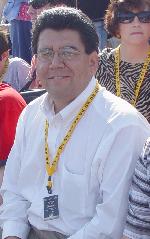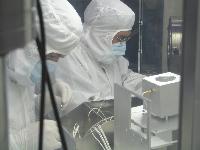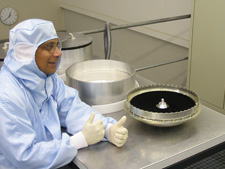Meet the IBEX Team: Benjamin Rodriguez

Benjamin Rodriguez loves it when something goes wrong at work. As a senior engineering technologist for the Southwest Research Institute, Ben tests materials, electronics and instruments for the IBEX mission to make sure they can hold up to the harsh conditions of space before they are placed on the spacecraft. For him, the best part of the job is figuring out why things don't work.
"Technical challenges are what I thrive on," Ben said. "If something works the first time, I'm relieved but kind of disappointed. If something's not working, I say, 'Great! How can we make it better?' If I came to work everyday and everything worked the first time, I'd quit! I want something I can bite my teeth into, and technical challenges keep me going."

Image Credit: Southwest Research Institute
NASA sets exacting, rigorous standards for equipment that goes into space so that it doesn't fail under the extreme conditions there. Ben builds electronics and tests the materials to makes sure they meet the standards, figures out why they may not be working correctly, and collaborates with scientists and engineers to come up with cost-effective solutions to any problems.
For example, Ben recently tested some ceramic insulators for the IBEX spacecraft. Since ceramic easily absorbs oils from human hands, the insulators had been glazed with a material to prevent contamination, which could severely damage them. "I noticed there were bubbles - black spots - with the glazing. I had a hunch that there were issues… and when I tested it, it started arcing. In order to find the cause, we stripped the glazing with sandblasting and they passed with flying colors," he said.
Figuring out how to solve technical problems like that is the best part of Ben's job. "That's what I love to do - the analysis, the testing and to find the solution. If it's not a good marriage of materials, you get a divorce!" he said.
Ben says that discovering why certain materials aren't working well together is a little like a television show. "I think there's a forensic science show (CSI) on TV that I've seen a few times where they investigate and analyze the evidence from crimes. That's similar to what I do. They use the same tools, like scanning electron microscopes. I love using all my tools [to solve a problem]," he said.
Working hard to solve problems runs in Ben's family. The Rodriguez family immigrated to the west Texas town of Pecos from Chihuahua, Mexico when Ben was four years old. "I came across the border on a horse, and my uncle picked us up on the other side," he said. His father hadn't had an education in Mexico, but he was determined to learn to read and write English. Each day before he left for work, Ben's father packed an English dictionary with his lunch, and studied during his break. At night, he would ask Ben and his siblings about the pronunciations and meanings of new vocabulary words. "My father has an unbelievable work ethic. He can still outwork me," Ben said.
A few years later, Ben's father completed a correspondence course in home electronics. Ten-year old Ben began helping his dad repair TVs and record players. "[My father] always inspired me. He can build anything, and he has never said, 'I can't do that,'" Ben said. Soon after, Ben began working at a TV repair shop.
His father's example inspired Ben to continue his own education. "When I was a kid, I wanted to go to MIT [Massachusetts Institute of Technology] so bad, so I started asking questions to the guidance counselors at school about how much it was. They told me it cost too much, and I readily accepted their answer," Ben said. "We were very poor growing up, and I could not burden my father by having him pay for it. I did not know about grants, scholarships and loans. If I had known what I did now, I would have gone. I love the way my life has turned out, but if I could do it again I would have taken out loans and I would have gone to college. Looking back, the [guidance] counselors could have helped me out a little bit more."
Instead of going to MIT, Ben received an associate's degree from a technical school. After completing his degree, Ben went on to work for Texas Instruments in their defense division, and later got a job with Sony. He gained valuable experience working in a vacuum environment and with electronics, and learned about how materials react. He applies these skills to his work for the IBEX mission.
Ben is currently on his way to earning a bachelor's degree in electrical engineering from St. Mary's University in San Antonio, located five minutes away from his office. However, his progress has been slow. "My five kids, two dogs, goats, chickens, ducks, two-and-a-half acres and wife keep me very busy. I'm going to school, but I'm doing it during my lunch break. Whenever someone asks me when I'm going to get my degree, I say, 'Do you want this in light years?'"
Ben demands that his children, ages 16, 14, 6, 5 and 3 earn college degrees after high school. "I expect them to go to college. They already know. We home school [the youngest four kids], so during school I go home and teach my son math, and next year I'm going to teach the science portion. The oldest son is in public school. It keeps my wife and me very busy," he said.
He sets a good example by continuing to learn as well. "Particle physics is very interesting to me, so I've been reading books about it and asking people at work about it. I also want to learn more about the science of instruments [on the spacecraft]," he said.
In what spare time he has, Ben enjoys hunting, go-karting and playing video games with his sons. He also makes time to play Barbies and have tea parties with his daughters. He is especially glad that his oldest sons are mature enough to baby-sit his younger children so that he can spend time alone with his wife. "Dates are very important in our marriage, and we've been married many, many years," he said.
